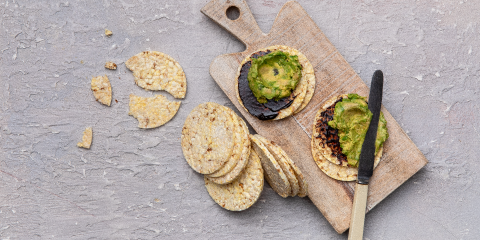Get Your Best Night’s Sleep by Looking After Your Gut Health

Do you struggle falling asleep or achieving a quality night’s rest? You are not alone if you find getting to sleep and staying asleep a mission. Approximately 13-33% of Australians find falling or staying asleep a battle. There are many factors that can affect your sleep quality. One which may surprise you is the role that your gut microbiome plays in promoting a restful night’s sleep.
Your gut microbiome is as unique to you as your fingerprint and everyone’s optimal microbiome balance is slightly different. Saying this, there are key lifestyle factors which promote health promoting microbes in all individuals which support the health of your body and it’s functioning. This includes including a variety of different plant-based foods each day. Foods such as whole grains, or whole grain containing foods like Corn Thins slices, nuts, seeds, legumes, beans, vegetables, and fruit. Each of these different types of foods feeds the health promoting microbes in your gut different fuel sources such as prebiotic fiber and polyphenols. Prebiotic fiber is a type of non-digestible carbohydrate which are fuel sources for the health promoting microbes which live in your gut. A gut loving goal can be to include 30 different plant-based foods a week.
When your microbes eat the fuel sources provided, they create messages such as short chain fatty acids, neurotransmitters, and secondary bile acids which have effects on the functioning and health of your body. This includes metabolites and compounds which impact your sleep including sleep promoting hormones such as melatonin and gamma-aminobutyric acid. Also, compounds and metabolites which help to keep you awake and alert such as cortisol, epinephrine, dopamine, orexin, serotonin, histamine, and acetylcholine.
If your gut microbiome is in a suboptimal state this may impact the amount and type of messages sent out by your gut microbiome. Many factors can disrupt the healthy balance of your gut. This includes eating a diet high in red meat or ultra-processed foods, stress, and certain medications, just to name a few. Research now provides new insight to the potential bidirectional link between your sleep quality and the health of your gut microbiome.
One review investigated the bidirectional link between sleep quality and your gut microbiome. As sleep deprivation leads to dysfunction of your gut microbiome and a suboptimal gut microbiome can lead to sleep disorders. This provided further insight to the potential role of your gut microbiome in getting a good night’s sleep.
Another review evaluated the potential of prebiotic, postbiotic and probiotics to improve sleep quality as well as reduce stress and anxiety. Probiotics can be defined as ‘live microorganisms which when administered in adequate amounts confer a health benefit on the host.’ Postbiotics are the metabolites that the probiotics produce after they eat the prebiotic fuel. The review concluded that although more research is needed there is some evidence that prebiotics, postbiotics and probiotics such as bifidobacterial and lactobacilli may improve sleep quality and reduce stress.
Another study investigated the effects of the types of gut microbes present in men who ate meals late at night. This cross-sectional pilot study used demographic information, questionnaires, and a stool sample to determine the types of gut microbes present. Erysipelotrichales phyla were found to be at significantly higher levels in the men who ate meals late at night. More research is needed but there may be links to the types of microbes present and sleep quality as well as risk of health conditions such as metabolic diseases.
Take home message: There are many lifestyle strategies which can help to set you up for your best night’s sleep. A strategy that you may not have tried is one which includes lifestyle choices to support an optimal gut microbiome.
References:
- Mohammadi Z, Bishehsari F, Masoudi S, Hekmatdoost A, Stewart DA, Eghtesad S, Sharafkhah M, Poustchi H, Merat S. Association between Sleeping Patterns and Mealtime with Gut Microbiome: A Pilot Study. Arch Iran Med. 2022 May 1;25(5):279-284. doi: 10.34172/aim.2022.46. PMID: 35943002.
- Haarhuis JE, Kardinaal A, Kortman GAM. Probiotics, prebiotics and postbiotics for better sleep quality: a narrative review. Benef Microbes. 2022 Aug 3;13(3):169-18 doi: 10.3920/BM2021.0122. Epub 2022 Jul 11. PMID: 35815493.
- Hill, C., Guarner, F., Reid, G. et al. The International Scientific Association for Probiotics and Prebiotics consensus statement on the scope and appropriate use of the term probiotic. Nat Rev Gastroenterol Hepatol 11, 506–514 (2014). https://doi.org/10.1038/nrgastro.2014.66
- The microbiota-gut-brain axis in sleep disorders. ZheWang et al. Sleep Medicine Reviews. Science Direct. Available online 31 August 2022. https://www.sciencedirect.com/science/article/abs/pii/S1087079222001046
- Lack L, Miller W, Turner D. A survey of sleeping difficulties in an Australian population. Community Health Stud 1988; 12: 200-207.
- Bartlett DJ, Marshall NS, Williams A, Grunstein RR. Sleep health New South Wales: chronic sleep restriction and daytime sleepiness. Intern Med J 2008; 38: 24-31.